- Home
- Harlan Coben
Play Dead Page 3
Play Dead Read online
Page 3
'We don't have to talk about basketball, you know.'
The sarcasm was still there. 'We don't?'
His smile remained unfazed. 'No, we don't. Believe it or not, I'm capable of discussing matters of greater substance: economics, politics, peace in the Middle East -- you name it.' He snapped his fingers and his smile grew. 'I have an idea. Why don't we talk about something really intellectual -- like modeling! But no. I mean, it would be impossible for you to imagine a thinking person who doesn't enjoy watching people whose brain size is in direct proportion to their body-fat level try to look as much like a mannequin as humanly possible.'
For a moment their eyes met, and then Laura lowered her head. When she looked up again, David was smiling in such a way as to soften his words.
'Lighten up, Laura,' he said gently, an expression she would hear so many times in the future. 'I wasn't trying to do anything but talk to you. I've read a lot about you and Svengali -- yes, some basketball players can indeed read -- and I thought you would be an interesting person to meet. I wasn't looking for anything else but with your looks, I'm sure you think this is just another line. And I don't blame you. Maybe it is.'
He bowed slightly and began to turn. 'I won't bother you anymore. Enjoy the party.'
Laura watched him walk away, hating herself for being so defensive, for not trusting the motives of even one man. He had spoken her mind as though her forehead was a window in which he could see her thoughts. But even so, this man would be all wrong for her. A jock? Forget it. She decided simply to push David Baskin from her mind. Strangely, she couldn't do it.
Back in Australia, a near-naked Laura leaned over and reached for the clock.
10:15 p.m.
The sound of the bush penetrated through the darkness that had blanketed her window. If it were anybody else but David, she would be seriously worried. But David was a superb swimmer, a near-Olympic participant, and more to the point, he was masterfully unpredictable, always throwing a surprise at those who knew him, always tossing an unexpected curve into life. And this was one of the reasons the sports media loved him so. He was the player whose locker the reporters rushed to after a game, the man with the perfect quote for the morning edition. He was the polite-yet-cocky superstar who always managed to live up to his off-color predictions.
Laura threw a blanket over her body. The night air was cool, tingling her nerves as it gently caressed her skin. Hours came and left, taking with them the excuses that had staved off Laura's panic and dread.
She got dressed at half past midnight and headed down to the lobby. The same receptionist was still on duty and Laura wondered if he ever slept.
'Excuse me,' she began, 'have you seen my husband?'
'Mr Baskin? No, ma'am. Haven't seen the mate since he went swimming.'
'Did he say anything to you before he left?'
'Not a peep, ma'am. He just handed me the key and that note I gave you. He didn't even look up.' The receptionist saw the worried look on her face. 'Has he not shown up yet?'
'No, he hasn't.'
'Well, now, I wouldn't worry too much about that. Your mate has got quite a reputation in the papers of being a bit of a wild one. He'll be back by morning.'
'I'm sure you're right,' she said, unconvinced. She considered looking for him but realized it would serve no real purpose except to satisfy her need to -- in her mind at least - do something beside sit in their suite. But the reality was that a lone American strolling through the Australian bush in complete darkness hardly constituted a competent rescue party. More likely, David would come home while she was busy getting lost in the wilds.
Laura went back to her room, firm in the decision that she would not panic until morning.
When the room's digital clock read 7:00 a.m., Laura officially began to panic.
Chapter 2
'The call will be put through in a moment, ma'am.'
'Thank you.'
Laura sat back and stared at the telephone. With the time difference, it was nearly nine p.m. yesterday in Boston and she wondered if T. C. was going to be home yet. His shift normally ended at a little past eight and she knew that he often stayed a lot later.
Laura's hands trembled, her face and eyes harried and swollen from the torment of the seemingly endless night she had just endured. She glanced out the window and saw the sun shining. The bright rays and the clock beside her bed were the only clear signs that last night had turned into today, that the night had indeed given way to morning. But for Laura, the night continued, her heart squeezed in a nightmare that would not move on.
She closed her eyes for a moment and remembered the second time David Baskin had entered her life. It was three weeks after their initial encounter at the Boston Pops, three weeks in which their short conversation constantly jabbed at the back of her mind like a dull ache, never all-consuming but still bothersome enough to make its presence felt whenever she tried to forget about it.
Subconsciously (or so she would claim), Laura began to skim through a few of the many articles about him. Though the press could not shovel enough praise about David's talent, sportsmanship and positive influence on the game, Laura was more fascinated (well, not fascinated, she told herself; more like interested) by the few sprinkles of information about his upbringing, his academic prowess at the University of Michigan, his time spent in Europe as a Rhodes Scholar and his selfless work with the handicapped. She found herself feeling oddly guilty about the way she had treated him, as though she had somehow to even the score or stay forever in his debt. It might be nice to see him again, she told herself, and maybe just apologize so he would see that she wasn't really a cold person.
That was when she began to accept invitations to functions and gala parties that he was likely to attend. She, of course, would never admit that David Baskin had anything to do with her social calendar. It was just coincidence, she would claim. Svengali needed her exposure at these events and if David Baskin happened to be there, well, life sometimes works that way.
But to her inward dismay, David only made token appearances, smiling broadly as people gathered around him to shake his hand and slap his back. Laura thought she noted a wince or small look of repulsion on his face as these phonies reached out to touch him, but it may just have been her imagination.
David never approached her, never so much as glanced her way. Finally, Laura decided to do something truly childish. Spotting him by the bar at one such event, she took what has been termed by teenage girls as a 'strategic walk' -- i.e., a casual stroll where she would 'accidentally' bump into him. It worked. He spotted her. He smiled cordially at her (or was there something else in the smile? like mockery?) and then moved on without a word. Her heart sank.
Laura returned to her office, fuming. She felt embarrassed at her behavior, upset she was acting like a high-school girl with a crush on the football captain. She could not understand why she felt this need to confront him again. Was it simply because he had bested her, made her reconsider her normal behavior and defense mechanisms? Or was there an attraction -- albeit dormant -- causing this static electricity in her brain? True, he was not bad-looking, rather handsome in a non-conventional way. His face and body were dark and strong like a lumberjack on a lite beer commercial. His green eyes were warm and friendly, his thick hair groomed short. Actually, he was quite attractive, more natural and real-looking than the supposedly gorgeous male models she used to work with.
But even if Baskin wasn't a typical, self-centered, immature jock, he was nonetheless a jock, hero-worshipped by adolescents of all ages, a man who played a child's game as a career. Undoubtedly, he was playboy-athlete, surrounded by airy bimbos who sought the spotlight and wanted to get on television with the other wives in the stands. And Laura wanted nothing less than to be considered another bimbo, another conquest by the immortal Celtic great. Clearly, David Baskin was the very antithesis of what she would want in a man, if indeed she had been interested in a relationship at all. Right now, there was no roo
m for a man. Svengali was her ambition, her life-long dream and partner.
Laura tilted her chair back and put her feet on her desk. Her right leg shook as it always did when she was somehow uptight or in deep thought. Her father had the same annoying habit. They both drove people crazy because the movement was no mere quiver -- it was a full-fledged shake. When she or her dad really got that right leg going, the chair, the desk, the very room would vibrate under the leg's tenacious assault. For those in the area, it was an unnerving spectacle, one that Laura had tried unsuccessfully to stop herself from doing.
The vibrations her leg caused eventually knocked her pencil-holder off the desk, but she did not stop to pick it up. After a few more minutes of leg shaking, Laura managed to dismiss the basketball player from her mind as Marty Tribble, her Director of Marketing, entered her office with a large smile.
Marty Tribble was not a man who smiled all that often during working hours. Laura watched him confidently stroll into her office, his hand pushing away the few strands of gray hair that had lasted the five decades of his life, his face beaming like a Little Leaguer after his first homerun.
'We've just made the advertising coup of the year,' Marty exclaimed.
Laura had never seen him act like this before. Marty Tribble had worked with Laura from Svengali's conception. He was a serious-faced executive, a down-to-earth conservative in a rather liberal, flighty business. His sense of humor was famous around the office only because no one believed he had one. Crack a joke in front of ol' Marty and you'd see the same reaction if you tickled a file cabinet. He was the office rock, not a man who became excited over trivialities.
'Which product?' she asked.
'Our new line.'
'The casual walking shoes and sport sneakers?'
'The same.'
Her eyes met his and she smiled. 'Sit down and start talking.'
The plodding Marty (he wanted to be called Martin but everyone called him Marty for that very reason) practically leaped into the chair, his legs showing a spry-ness not yet seen in the downtown Svengali headquarters.
'We're going to run a national advertising campaign on television starting this fall. We'll introduce the entire line to the public.'
Laura waited for him to say more, but he didn't. He just continued to smile, looking like a game-show host who was trying to build suspense by not revealing the answer until after the last commercial. 'Marty, that's hardly an earth-shattering announcement.'
He leaned forward and spoke slowly. 'It is when your spokesman is the sport's idol of the decade. It becomes even more earth-shattering when that sport's idol has never endorsed a product before.'
'Who?'
'David Baskin, alias White Lightning, the Boston Celtics superstar and three-time league MVP.'
His name struck her like a sharp slap. 'Baskin?'
'You heard of him?'
'Of course, but you say he's never done any endorsing before?'
'Only those ads for handicapped children.'
'Then why us?'
Marty Tribble shrugged. 'Beats the hell out of me, but Laura, all we have to do is throw a good advertising blitz during basketball games in the fall and David Baskin's broad shoulders will carry Svengali's sneakers to the top of the sporting world. He'll give us instant recognition and legitimacy in the market. It can't miss. I'm telling you the public loves him.'
'So what's our next step?'
He reached into his breast pocket where he neatly kept his matching Cross gold pen and pencil. His fingers plucked out two tickets.
'You and I are going to the Boston Garden tonight.'
'What?'
'We're going to watch the Celtics play the Nuggets. The contracts are to be signed afterwards.'
'So why do we have to go to the game?'
Again he shrugged. 'I don't know. For some strange reason, Baskin himself insisted on it. He said it would be good for your soul or something.'
'You're kidding.'
He shook his head. 'It's part of the deal.'
'Wait a minute. Are you trying to tell me that if I don't go to this game -- '
'Then the deal is off. Right.'
Laura tilted her chair back again, her fingers interlocked, her elbows resting against the arm-rests. Her right leg started doing its gyrating dance of annoyance again. Slowly, a smile formed on her lips. She began to nod her head, quietly chuckling to herself.
Marty eyed her worriedly. 'So, Laura, what do you say?'
For a moment, the room was still. Then Laura turned her eyes toward her Director of Marketing.
'It's game time.'
The Boston Garden experience had been nothing short of shocking. When Laura first entered the old eyesore in North Station, she was skeptical. The Garden? This decrepit old building was the Boston Garden? It looked more like the Boston Penitentiary. Most arenas in the country were modern glass and chrome towers, shining and sleek with air-conditioning and cushioned seats. But not the Garden. The Celtics' home was a run-down, seedy hunk of cement with a beer-stale odor and an oppressive heat all its own. The splintered seats were hard, broken, uncomfortable. Glancing around her, Laura was reminded more of a Dickens novel than a sporting event.
But then she watched the thousands of anxious fans fill the Garden like parishioners on Christmas morning. To them, the climate was utopian, the aroma was that of roses, the seating arrangements plush and luxurious. It was as if these people thrived on escaping the niceties of the day to delve into the more perfect dwelling of their Celtics. Here was the Boston Garden, the zenith of the world's millions of college, high-school, backyard and driveway basketball courts, the place that countless children had imagined hitting the winning jump shot, grabbing the winning rebound. She looked up at the rusted rafters and saw the championship banners and retired numbers standing proudly like medals on a general's chest. Silly as it sounded, this place was history, as much a part of Boston as the Bunker Hill Monument and Paul Revere's house, but there was one big difference: the Celtics were living history, constantly changing, consistently unpredictable, always coddled and loved by their fair city.
The frenzied crowd cheered when the players took the floor for warm-ups. Laura spotted David immediately. From her seat in the third row, she tried to catch his eye but it was as if he were alone on the parquet floor, completely oblivious to the thousands who surrounded him. His eyes were those of a man possessed, of a man on a mission from which he could not be diverted. But Laura thought she also noted a peacefulness in the bright green, the calmness of a man who was where he wanted to be.
Next: the opening tap.
Laura's skepticism dissolved away slowly, like acid eating through a steel chain. By the end of the first quarter, she found herself smiling. Then laughing. Then cheering. Finally awestruck. When she turned around and gave the man behind her a 'high five,' she had officially been converted. The basketball game reminded her of the first time she had been to the New York Ballet at Lincoln Center as a wide-eyed five-year-old girl. There was a similar artistry to the basketball players' movements, like a complicated, well-choreographed dance interrupted by unpredictable obstacles that only made the spectacle all the more fantastic to the eye.
And David was the principal dancer.
She immediately understood the sweeping praise. David was poetry in motion, diving, leaping, swooping, spinning, twisting, chasing, ducking, pirouetting. There was a tenacious, aggressive gracefulness to his movements. One moment he was the cool floor leader, the next a daredevil trying the impossible like some comic-book hero. He would drive toward the basket only to have a man cut him off and then, like a true artist, he created, often in mid-air. When he shot, his eyes would focus on the rim with a concentration so strong she was sure the backboard would shatter. He had a sixth sense on the court, never looking where he passed, never glancing at the ball on his fingertips. When he dribbled, it was like the ball was part of him, just an extension of his arm that had been there since birth.
&nbs
p; And then the finale.
Scant seconds remained, the outcome very much in doubt. The beloved boys from Beantown were down by one point. A man wearing the familiar Celtics green and white passed the ball to David. Two men from the enemy camp covered him like a blanket. One second remained. David turned and launched his unique, high-arching, fade-away jumpshot. The shot lofted the orange sphere impossibly high, heading for its target from an impossible angle. The crowd stood in unison. Laura's pulse raced as she watched the ball begin its descent, the game and hearts of the crowd riding on its slow movement toward the basket. A buzzer sounded. The ball gently kissed the top of the glass backboard, and then the bottom of the net danced as the ball went through for two points. The crowd screamed. Laura screamed.
The Celtics had won another game.
'Telephone is ringing, Mrs Baskin,' the Australian accent said.
'Thank you.'
Laura rolled over on her stomach, the phone gripped tightly in her hand. She wondered if it had been during that fade-away jumpshot that she first had begun to fall in love with David. She heard a click and the ring that originated in Boston traveled halfway around the planet to the small town of Palm's Cove.
On the third ring, the receiver on the other end was lifted. A voice came through the static-filled wire.
'Hello?'
'T.C.?'
'Laura? Is that you? How's the honeymoon?'
'Listen, T.C., I need to talk to you.'
'What's up?'
She quickly recounted the past day's events. T.C. listened without interrupting and, like Laura knew he would, he immediately took control.
'Have you called the local police?' T.C. asked her.
'Yes.'
'Good. I'll catch the next plane out of here. Captain said I'm due for a vacation anyhow.'
'Thanks, T.C.'
'One more thing: stress to the police the importance of keeping this quiet. The last thing you need is a plane-load of reporters pounding on your door.'
'Okay.'
'Laura?'
'Yes?'
He heard the strain in her voice. 'He'll be all right.'

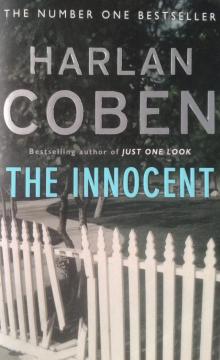 The Innocent
The Innocent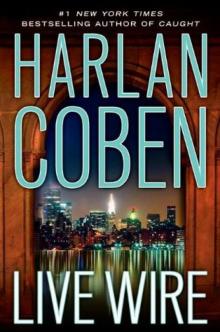 Live Wire
Live Wire Play Dead
Play Dead Drop Shot
Drop Shot Seconds Away
Seconds Away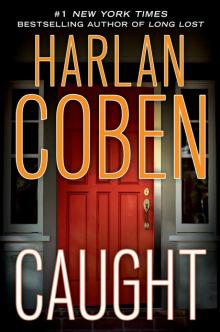 Caught
Caught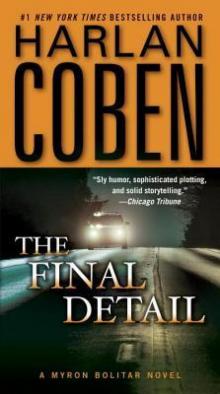 The Final Detail
The Final Detail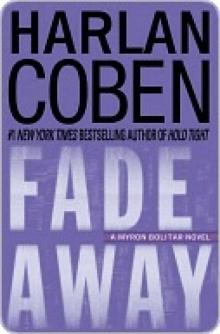 Fade Away
Fade Away Home
Home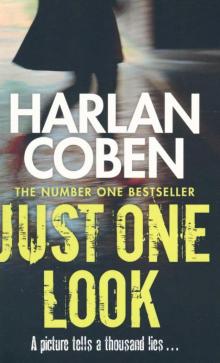 Just One Look
Just One Look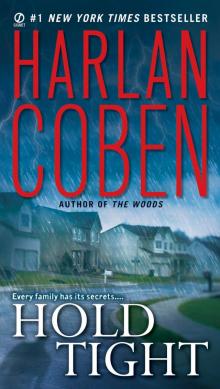 Hold Tight
Hold Tight Fool Me Once
Fool Me Once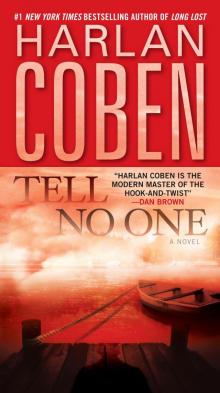 Tell No One
Tell No One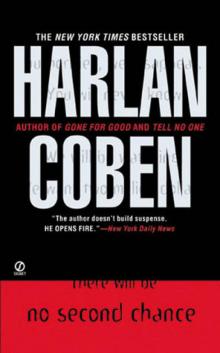 No Second Chance
No Second Chance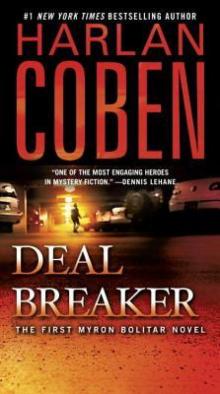 Deal Breaker
Deal Breaker Long Lost
Long Lost One False Move
One False Move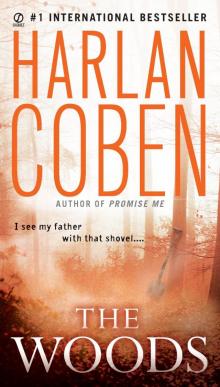 The Woods
The Woods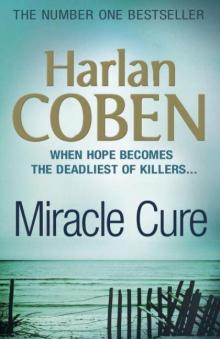 Miracle Cure
Miracle Cure Found
Found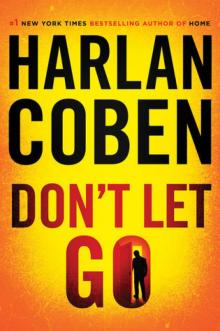 Don't Let Go
Don't Let Go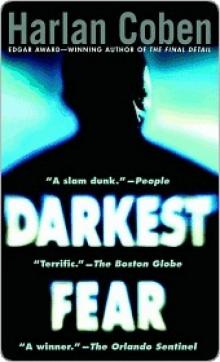 Darkest Fear
Darkest Fear The Stranger
The Stranger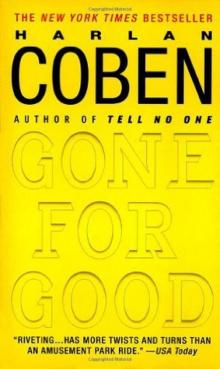 Gone for Good
Gone for Good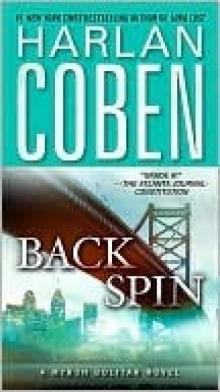 Back Spin
Back Spin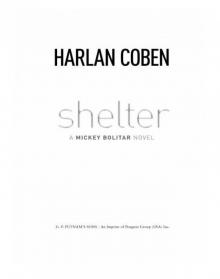 Shelter
Shelter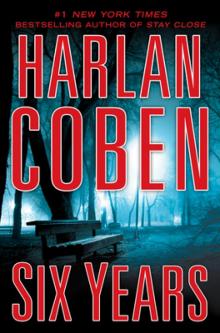 Six Years
Six Years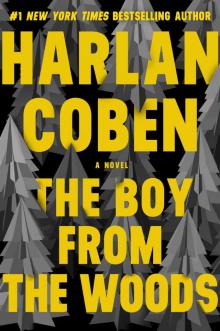 The Boy from the Woods
The Boy from the Woods Missing You
Missing You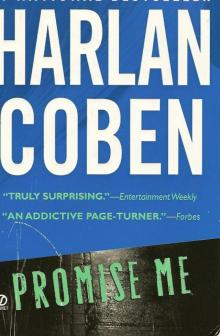 Promise Me mb-8
Promise Me mb-8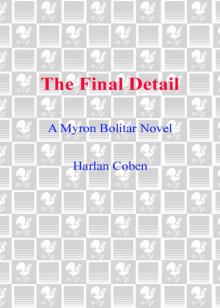 The Final Detail: A Myron Bolitar Novel
The Final Detail: A Myron Bolitar Novel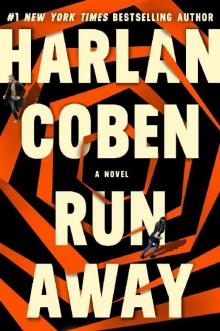 Run Away
Run Away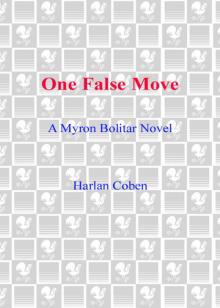 One False Move: A Myron Bolitar Novel
One False Move: A Myron Bolitar Novel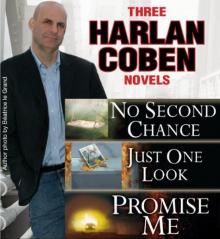 Three Harlan Coben Novels
Three Harlan Coben Novels the Woods (2007)
the Woods (2007) Tell No One (2001)
Tell No One (2001) the Innocent (2005)
the Innocent (2005)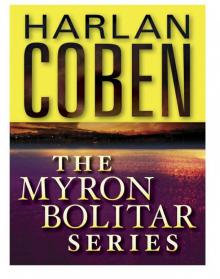 The Myron Bolitar Series 7-Book Bundle
The Myron Bolitar Series 7-Book Bundle Gone for Good (2002)
Gone for Good (2002) Caught (2010)
Caught (2010) Hold Tight (2008)
Hold Tight (2008)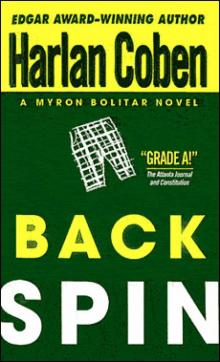 04 - Back Spin
04 - Back Spin Miracle Cure (1991)
Miracle Cure (1991)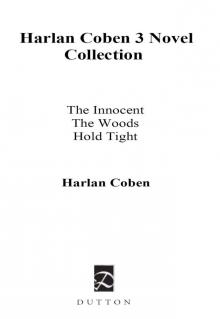 Harlan Coben 3 Novel Collection
Harlan Coben 3 Novel Collection Just One Look (2004)
Just One Look (2004)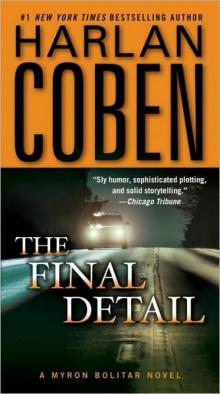 The Final Detail mb-6
The Final Detail mb-6 Play Dead (2010)
Play Dead (2010)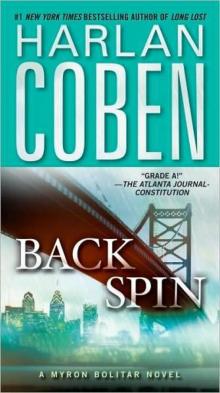 Back Spin mb-4
Back Spin mb-4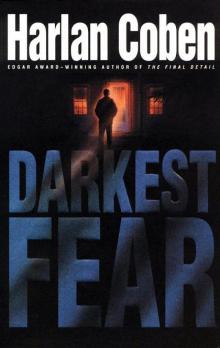 Darkest Fear mb-7
Darkest Fear mb-7